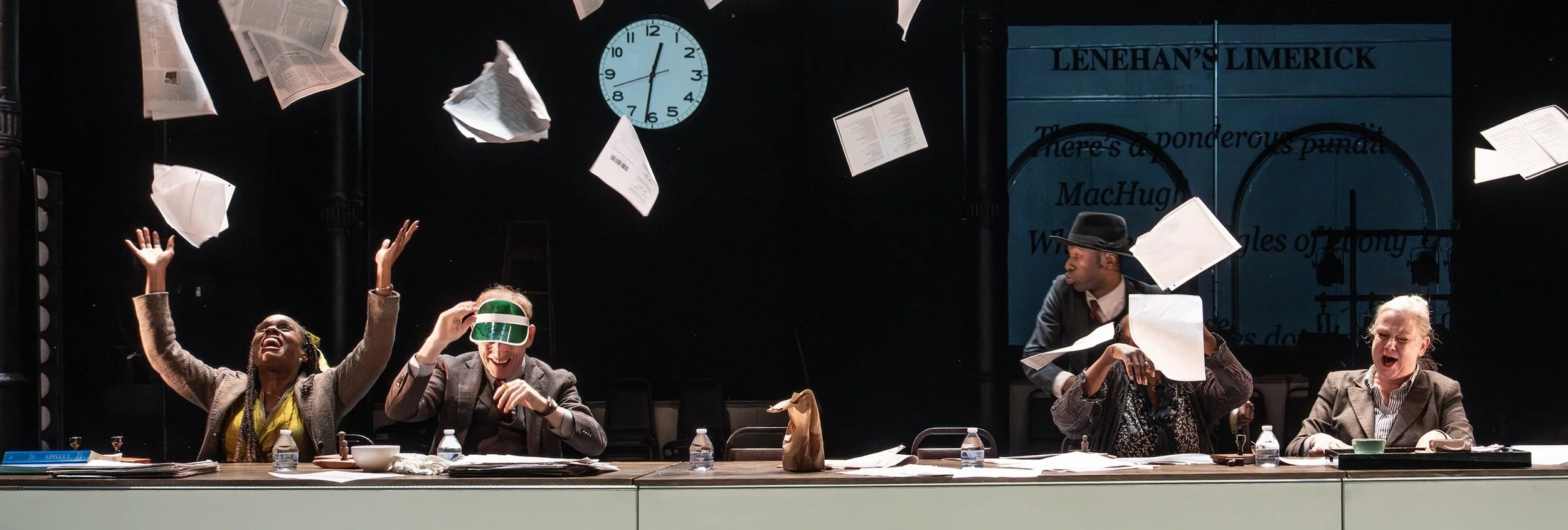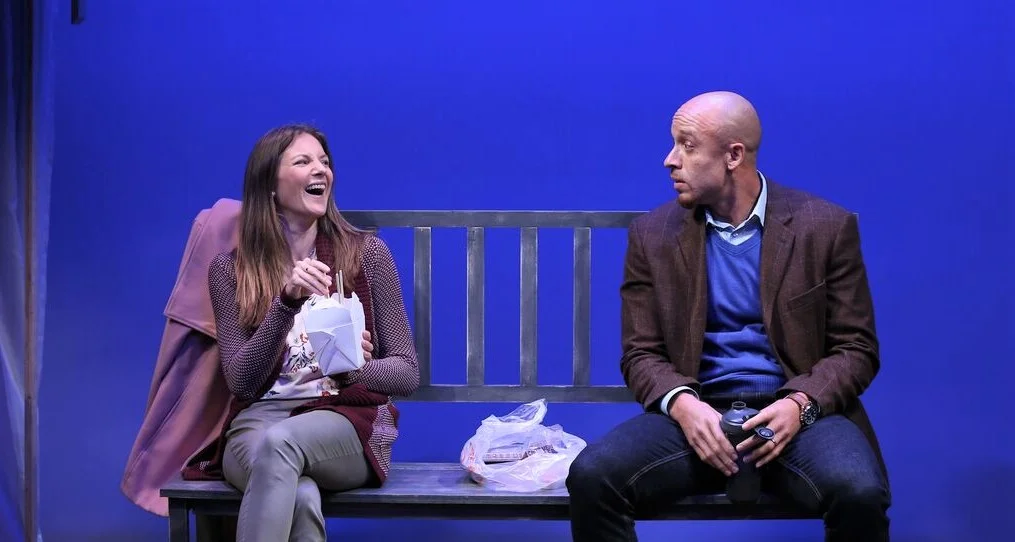Three productions of Henry VI, William Shakespeare’s seldom staged trilogy, have cropped up Off-Off Broadway since January. The latest, by the ambitious National Asian American Theatre Company (NAATCO), brings epic pageantry and violence to the intimate Mezzanine space at the A.R.T./New York complex on West 53rd Street.
Heist!
Heist! is a funny, upbeat new showcase for highly talented musical theater artists. Directed by James Will McBride, the show concerns three bank robbers —Gil (Cordara Newson), Jack (Alec Irion) and Chris (James Cella)—and a job gone bad. Their robbery fails, and only Gil and Jack escape. Jack spirals downward at the news that Chris was killed by the police.
Intrusion
Discussing rape is not easy in any context. It has scarred our collective humanity; in many societies it is still a taboo subject; it is almost too offensive to broach. Intrusion, a one-woman show written and performed by writer/actor/activist Qurrat Ann Kadwani and directed by Constance Hester, finds a way.
Wars of the Roses: Henry VI & Richard III
Two years ago New York theatergoers had the opportunity to see Kings of War, Ivo Van Hove’s compilation of five Shakespearean history plays. Tracing the royal lineage of Henry V through Henry VI and ending with Richard III (with a few additional coronations in between), Van Hove’s four-hour-plus production was a grand, sweeping, and technologically sophisticated epic. Working on a much smaller scale, director, adaptor, and actor Austin Pendleton has created his own synthesis of the battles between the Houses of Lancaster and York for Wars of the Roses: Henry VI & Richard III, which is currently playing at the 124 Bank Street Theatre. A mashup of Shakespeare’s Henry VI, Part 3 and Richard III and running a mere three hours, Pendleton’s adaptation offers its fair share of both theatrical rewards and pitfalls.
Summer Shorts 2018 (Series A)
A Pirandellian lark and two plays with feminist concerns constitute Summer Shorts (Series A), the invaluable annual presentation of one-acts at 59E59th Street Theaters by Throughline Artists.
Summer Shorts 2018 (Series B)
The inherent tensions of sibling rivalry, a father and son reunion and a budding office romance drive the three 30-minute plays that make up the uneven Series B of this year’s Summer Shorts festival, presented by Throughline Artists. And, perhaps unintentionally, this showcase of new American one-acts is also a lesson in how the invention of the smartphone has changed the craft of playwriting.
My Life on a Diet
My Life on a Diet, Renée Taylor’s hilarious one-woman show (cowritten and codirected with Joseph Bologna, her late husband), is a testimony to the power of a story and the story teller. In a beautifully beaded champagne evening dress and matching sneakers, she’s the size of a pixie and just as energetic. When she told her doctor she’s going to do a one-woman show, he wonders how, at 86 years old, she’s going to move around the stage for an hour and a half with arthritis, bursitis, sciatica, the beginning of osteoporosis and a broken foot? She tells him “I can jump! I can kick! I can do the mambo!” Then she admits: “In the pool. On dry land, I can walk and I can sit. I just have trouble sitting after I walk and getting up and walking after I sit.” So, she arrives at a happy medium and stays seated for her performance.
Brecht on Brecht
As audience members enter the Atlantic Stage 2, where the Potomac Theatre Project’s production of Brecht on Brecht is playing, they may be under the impression they have entered a quaint concert salon. There is a grand piano prominently positioned just off center stage, four music stands at the edge of the playing space, and the floor is covered with luxurious Oriental rugs. When the show begins, four ingratiating young performers carrying sheet music primly assume their positions behind the stands.
The Possibilities/The After-Dinner Joke
In what has become a rite of summer in New York, the Potomac Theatre Project (PTP) has taken up residence at the Atlantic Stage 2. The company’s first offering is a double bill featuring Howard Barker’s The Possibilities, directed by Richard Ramagnoli, and Caryl Churchill’s The After-Dinner Joke, directed by Cheryl Faraone. Although stylistically quite different, the plays generally fit together well in their emotionally dizzying and intellectually disorienting exploration of power and politics.
The Saintliness of Margery Kempe
Can a sinner become a saint? That is the question John Wulp explores in The Saintliness of Margery Kempe, first produced in 1958 at the Poet’s Theatre in Cambridge, Mass., and last seen in an Off-Broadway production the following year. The story is loosely based on the real life of Margery Kempe, a woman who lived in the 14th century and wrote the first known autobiography in Western literature. At the beginning of the play, Margery (the wonderful Andrus Nichols, who brings an energetic intensity to the role) declares, “Morality, damn all morality, damn, damn, damn.” A feminist long before the feminist movement, she seeks to shrug off the assumptions that inform her role as mother, housewife and religious community member. She hates it all and leaves home.
Skintight
Jodi (Idina Menzel), the fortysomething central character in Joshua Harmon’s attention-grabbing new drama, Skintight, is having a bad time. She has arrived unannounced at her father’s Greenwich Village townhouse to help celebrate his 70th birthday, even though she has been warned not to by her dad. But she’s determined to connect with those who love her in her time of trial: in Los Angeles she has just attended the wedding of her ex-husband to a perky young 25-year-old.
On a Clear Day You Can See Forever
Was Daisy Gamble, the leading character of On a Clear Day You Can See Forever, ever reincarnated as much as the Alan Jay Lerner-Burton Lane musical-comedy-operetta itself? In the show, about paranormal activity and past lives, Daisy’s seeming prior existence as a Regency beauty fascinates one Dr. Mark Bruckner, an analyst who believes in previous lives and ESP.
Conflict
The Mint Theater is reviving another thoroughly engaging play you’ve never heard of. This time it’s Miles Malleson’s Conflict, a 1925 political comedy, with fast-paced direction by Jenn Thompson and brightly polished performances from a noteworthy cast of seven.
Carmen Jones
Oscar Hammerstein II’s adaptation of Georges Bizet’s 1875 opera Carmen into a musical, Carmen Jones, is rarely staged, so the revival at Classic Stage Company production is a happy resurrection of his 1943 effort. Nonetheless, although it is gloriously sung, the 90-minute production doesn’t make a case that Hammerstein’s musical theater version is the equal of Bizet’s opera. It’s never going to be in the standard repertory.
Log Cabin
Arriving during gay pride month, Jordan Harrison’s new play explores currents of non-heterosexual identity in a nearly comprehensive way. Its characters cover the waterfront in terms of gender fluidity, with side trips to racial and class identity. Allen Moyer’s primary set is an apartment with ceiling-high bookcases and comfortable modern furniture. In spite of the elegance, however, Harrison’s characters might as well be living in the titular log cabin. They are sexual pioneers lost in a wilderness of fluctuating gender identity rather than ferocious animals and untamed nature.
Everyone’s Fine with Virginia Woolf
Elevator Repair Service (ERS), the adventurous downtown troupe known for theatrical adaptations of iconic modernist works, is parodying Edward Albee and Tennessee Williams in a new play by Kate Scelsa that has the cleverest title in town—Everyone’s Fine with Virginia Woolf. The production is directed at breakneck speed by the company’s founder, John Collins. It features visuals by Louisa Thompson (scenery), Amanda Villalobos (properties), and Kaye Voyce (costumes) that give the proceedings the kitsch-cluttered aesthetic that’s an ERS signature.
All I Want Is One Night
Time has not been kind to Suzy Solidor, the Parisian nightclub sensation of the 1930s. Solidor earned a reputation as “the most-painted woman in the world,” and her image was captured by some of the greatest artists of the 20th century, including Tamara de Lempicka, Pablo Picasso, Man Ray, and dozens of others. Known primarily for her erotic songs about lesbian desire, Solidor is all but forgotten today, but the immensely gifted singer and actress Jessica Walker may just rescue her from the footnotes of entertainment history. Walker’s new work, All I Want Is One Night, which is part of the Brits Off Broadway series at 59E59 Theaters, offers compelling reason to become reacquainted (or, as the case may be, acquainted) with the cross-dressing French cabaret singer.
Lonesome Blues
“Lonesome Blues,” a new musical at the York, is a historical dramatization of the life of Blind Lemon Jefferson through music. Jefferson was an itinerant Texas bluesman who was one of the first to be recorded by Paramount Records in the 1920s. He is said to have influenced everyone from Leadbelly to Bob Dylan to the Beatles. Jefferson went on to record 80 songs until his untimely death in his early 30s. He was found frozen near the river in Chicago. The blues, as does the play, tells the story of this rough life for African-Americans in America in the early 20th century. “Blues hits a nerve and that hurts” Jefferson declares.
Little Rock
Little Rock, Rajendra Ramoon Maharaj’s docudrama about the nine African American students who integrated a white high school in the Arkansas capital in 1957, seems especially relevant now. Near the end of the play, an actor assuming the persona of television news reporter Mike Wallace says, “It’s astonishing what the Nine from Little Rock have taught us as a people—that even children can, in a gentle way, shake the world for better.” It remains an important lesson today as schools face new and presumably insurmountable challenges. Indeed, as the inspirational and courageously outspoken Parkland, Fla., shooting survivors continue to demonstrate, adults can learn a great deal about social change and agitation from the youth.
The Fourth Wall
A.R. Gurney, who died in June 2017, was prolific to the end. Like Verdi, Henry James, and Philip Roth (a recently deceased contemporary of Gurney’s), this urbane playwright exercised robust creative powers far beyond customary retirement age. Judging by the number of high-profile revivals since his death (most notably last season’s superb Off-Broadway production of Later Life), Gurney’s wit and insight are still integral to American drama.























